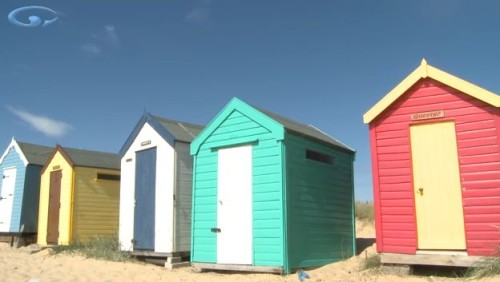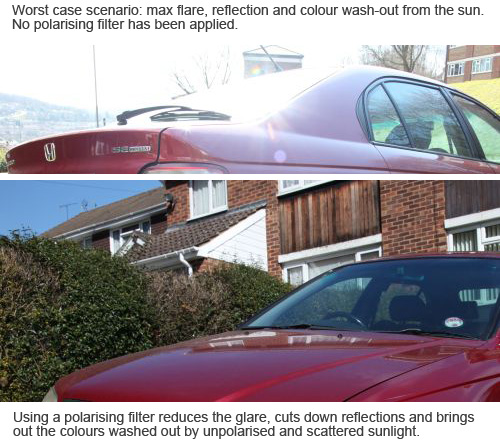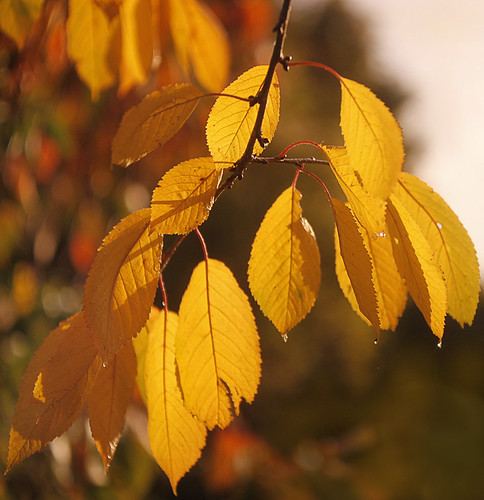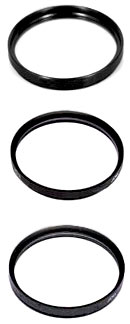
• Beach Huts •
Using polarising filters reduce glare, reflection and colour fade in your photograph. These filters are easy to use and produce great results.
[Image from the video]
Filter with a hidden impact
Photographic filters are light modifiers. They have a variety of different effects. Polarising filters are just one type of photographic filter. When you look at one it appears dark. It looks as if it would have no effect except to reduce the light in your image.
What does using polarising filters do for your photo? Light from the sun tends to be scattered by the atmosphere. The waves of light are out of alignment. When the light is very bright the glare causes a bright haze of light. This over-brightness can act to overwhelm a photograph. It especially tends to wash the colour out of the sky, whitening it. Using polarising filters helps reduce the glare. It filters out some of the light that is not aligned. Only the polarised light passes through the filter. This aligned light has reduced glare allowing the colours to come out. Skies are darkened. Reflections are reduced.
The results of using polarising filters
The result of darkened skies, reduced reflections and better colours can be dramatic. Here are a whole range of images on Google using polarising filters ![]() .
.

• Worst and best case scenario for using polarised filters •
Careful positioning and using polarising filters dramatically affects the outcome.
In the second (lower) photo the position is different. The direct sunlight is not directly entering the lens. Even so, without using a polarising filter there would be problems. Notice the bright blue sky. This would have been a very washed-out blue on this very sunny day. Notice the windscreen is almost transparent? The polarising filter has reduced the bright reflections and specular highlights. The reflections on the bonnet are also pleasant and not over-white. The car paintwork has a quality colour-depth. The whole quality of the lower photo seems better. All this despite the harsh direct light.
Actually using polarising filters
In the video Mike Browne shows how to use these useful filters. In particular you need to remember three things of particular interest…
- Using polarising filters is most effective when the light is coming at the lens from about 45° off the optical axis.
- While using polarising filters you will need to rotate the filter to find the most effective polarising position. You need to re-adjust it every shot. Each shot will have a different angle of light to the lens.
- Using polarising filters reduces the light able to enter the lens. Your light may be reduced by over two stops with a poor quality version.
Quality
High quality Polarisers are more expensive. They are time consuming and expensive to make. They also use expensive materials. However, the better ones maintain photographic quality. So it is worth spending the extra money. Poor quality polorisers may increase the digital noise from light scatter in the filter. They may also create aberrations and distort the image.
All photographic filters reduce the light entering the lens. A quality polariser will also reduce the light. But, they will affect the light much less than a poor quality polariser. Using polarising filters of a low quality may reduce the incoming light by as much as three stops. A quality polariser will tend to reduce light by only two stops (or less). So think carefully about what you purchase.
Buy now…
When buying a circular polarising filter make sure you get one that is the right size. The filter size of your lens is normally written on the inside of the front of the lens.
Recommended!
Circular polarising filters 

When using polarising filters buy the size that fits your lens. Also remember that the quality of the filter can affect the photo. High quality polarisers reduce aberrations. A higher quality filter will not reduce the light as much as a poor quality one.
Review a range of different filters here…
Circular polarising filters ![]()
Comments, additions, amendments or ideas on this article? Contact Us
or why not leave a comment at the bottom of the page…
Like this article? Don’t miss the next — sign up for tips by email.
Photokonnexion Photographic Glossary – Definitions and articles.
Other relevant articles
Circular Polarising filters
Definition: Polariser; Polarizer, Polarizing filter; Polarising filter;
Links in the page
Definition: Filters
Here are a whole range of images on Google using polarising filters ![]()
Definition: Lens flare; Flare (on a lens);
Definition: Lens aberration; Aberration; Aberrations (of a lens)
Definition: f number; f stop; Stop
Circular polarising filters ![]()

Damon Guy (Netkonnexion)
See also: Editors ‘Bio’.
By Damon Guy see his profile on Google+.





